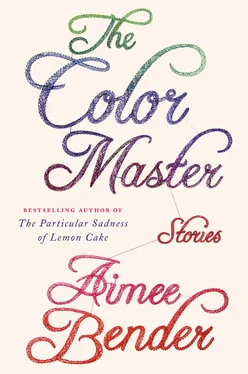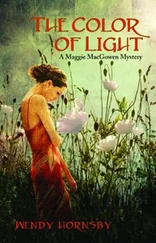Finally he asked, “Would you like to come in?”
He didn’t seem scary, and the house looked warm. He led me through the living room. It was inviting, with the flat-screen TV nestled above the fireplace and lavish plants in metal holders marking the corners, everything tidy and clutterless, but not in an oppressive way. In the kitchen, he put on a kettle without asking, which I appreciated. It seemed we both understood that if I didn’t like tea I just wouldn’t drink it.
The kitchen had pale-green tile and light wooden cabinets. I made a note of the placement of the knife block, just in case.
He prepared a Japanese barley tea as my hands and cheeks thawed.
“I lived in Kyoto for many years,” he said when the water was ready, pouring the mugs full. “And I drank this every day. Not the same here. There, it’s fresh, roasted. Here, it was packed long ago. Whispers.”
He tilted his head to the sitting area, by the window overlooking the empty lot.
“They’re building a new house there, supposedly,” he said, handing over my mug. “It’s been three years.”
We sat down and looked out the window together, at the leftover sock.
“That’s where it happened,” I said, taking a sip.
“They all had sex?” he said.
“A hundred of them.”
“And then?”
“The guy stole their wallets.”
“What guy?”
“The guy who told them to have sex on Mother Earth as a war protest.”
“Ah,” he said, nodding.
“You didn’t hear anything?”
“Not a thing.”
“I fell asleep,” I admitted.
We sat and sipped, the warm tea spreading through my chest. Barley tea. It felt good to be doing something. Not that I was quite sure what I was doing. I tried to think up an interesting question to ask him, maybe about his childhood, or his first love, or if he’d fought in any war, when he turned to face me, his squirrel eyebrows up. By then most adults would’ve launched into their usual list of annoying questions—my major, my plans for the future, my hopes and dreams—but he just raised a hand and poked at the air between us, as if to poke those questions aside.
“Was it a good episode?” I asked.
“Of?”
“ Law & Order ,” I said.
He shrugged. “I’d seen it before.”
He poked again at the air between us. Raised his hand, dusted the air aside, put his hand down. Waited. Raised his hand again, pushed at the air, put his hand down again.
“What are you doing?” I asked, trying to laugh.
When he did it again, I raised my hand back. While he dusted the air on one side, I dusted the opposing side. I pushed some air at him. He smiled. Pushed it back.
“Could you do me a favor?” he asked.
“Depends,” I said.
He indicated upstairs with his chin. “I need a lightbulb changed in the guest room,” he said. “You’re taller than I am.”
It was true; I was. I looked at the flight of stairs past the kitchen, the dim light above. It was a small two-story house, probably two bedrooms upstairs, one his, one guest. No sign of a cat, dog, or any other resident. A lightbulb. It was, by all accounts, dumb to go upstairs in the house of someone I did not know, especially a male stranger’s house at one in the morning. With everyone nearby fast asleep. That said, I still felt that if anyone were at risk, it was actually him; I’d trusted what I’d read about following my own fear instinct, and instead of feeling fear, what I felt was a slight thrill or even a flicker of aggression, like I might harm him, like he should be cautious about inviting me up.
“It’s a dumb idea,” I said, sniffing. “Stranger’s house.”
“I’ll sit right here,” he said. “I won’t move, I promise.”
“Oldest trick in the book,” I said. “Lightbulb changing.”
“It is true, though,” he said.
I sipped my tea. “Nah.”
Still, I felt a strange and powerful pull to his second floor.
“I’ll come by in the daytime with a friend,” I said, “and we’ll change every lightbulb you need.”
“Sure, of course,” he said, shrugging. “Thank you.”
He refilled his cup with hot water. From our spot in the kitchen, I could make out the side frames of paintings lining the stairway walls, chosen carefully over time to represent whatever he wanted to observe while ascending. He stirred his tea.
“Okay, fine,” I said, standing. “Twist my arm.”
He raised his eyebrows, surprised.
“I might steal something, you know,” I said.
“Go ahead,” he said, warmly. “Take whatever you like. It’s the first room on your left. Thank you, thank you so much.”
I left my mug and climbed the stairs, past paintings of green hills dotted with trees and sheep, painted by a person named Hovick. The old man sat at the table downstairs, sipping his tea. I could hear him, sipping loudly, nearly slurping, and he had been a polite and quiet sipper earlier, so I figured he was doing it to let me know he was staying put.
“Where’s the bulb?” I asked, at the top of the stairs.
“On the dresser,” he called.
The room was cheerful enough—a small bedroom with a twin bed, a vase holding a graceful twig that required no water, and a lush, light-green carpet that matched the kitchen tiles. A desk lamp glowed through a sheer, paisley-patterned shade. On the dresser was the new fluorescent bulb with its squiggly spiral up, and I turned off the overhead light, stood on a wooden chair, and unscrewed the fixture. The bulb was warm. With a bit of balancing, I reached up with the new bulb and screwed it in, and on with the fixture again, and a twist and a turn, and his loud sipping below reminding me I had nothing to fear. I pushed the chair back to the desk and surveyed the room once again, my gaze settling on the bedside table, where a book about Ohio flora lay next to a fluted lamp. “Done,” I called.
“Thank you,” he said, from the kitchen.
But I did not feel done. I picked up the book on Ohio flora. Inside, between pictures of dogwood trees, I found pressed petals, wrinkled and overlapping and folded, page after page. He had saved a whole bouquet. I punched the bed’s pillow in the center, to make it look as if a person had slept on it at some point. It was a headless pillow, a pillow that had not made contact with a head, a sight that made me feel inexplicably angry. I moved the twig to the other side of the vase. I looked under the bed and saw two slippers lined up neatly, the kind with a band over the toes made of floral terrycloth. I shook and emptied the book of Ohio flora petals all over the bed, until it was covered in dry purple flowers, like a honeymoon bed for one.
Downstairs, the man was staring out the window.
I settled into my seat.
“Thank you,” he said again. “I’ve heard so much talk about these fluorescent bulbs.”
Some kind of mood had descended upon him while I was in the room. His voice drizzled into nowhere as he spoke.
“Whose room is that?” I asked, reaching for my tea.
“My daughter’s,” he said.
“Is she okay?” I asked.
He turned to me. His eyelids flickered lower. “She lives with her mother.”
“Where?”
“In Egypt.”
“Does she visit you?”
“No.”
“Why not?”
“She is allergic to green,” he said.
He was looking out the window at his little side garden again, so I looked too, at the budding spring trees, half-lit by someone’s porch lamp, and at the hints of grass in the garden, peeking through winter. Soon enough, the whole town would be covered in green.
“All shades?”
“Every one,” he said.
“So why don’t you move to her?”
“I need it to live,” he said.
Читать дальше












